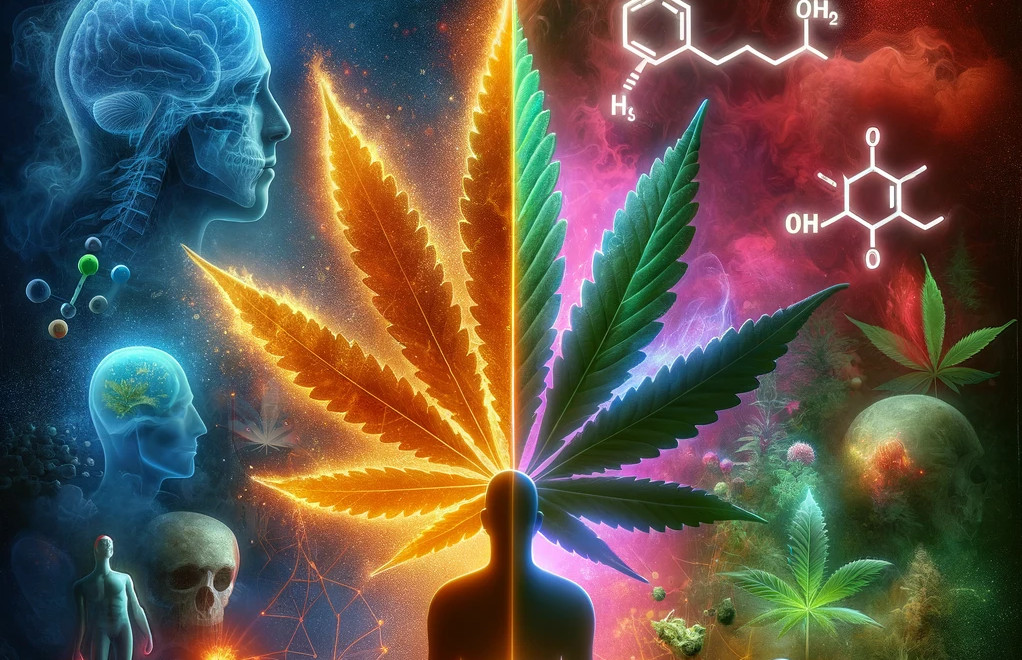Welcome to our latest blog, where we dive deep into the world of cannabinoids, focusing on Delta 8 and Delta 9 THC. As we explore the psychoactive effects, addiction potential, and health risks associated with these substances, we aim to shed light on a topic that touches the lives of many, especially those navigating the challenges of dual diagnosis and mental health. Our journey through the roadmap of Delta 8, 9, and even Delta 10 THC seeks not only to inform but also to engage and empower our readers with knowledge that is both relevant and critical. At the heart of this exploration is a concern for mental wellness and the pursuit of understanding, particularly as it relates to the impact of these cannabinoids on mental health and the phenomenon of marijuana-induced psychosis. Join us as we untangle the science, the risks, and the stories behind these potent compounds, always with an eye towards promoting a healthier, more informed community.
Psychoactive Effects and Health Risks
- Both Delta 8 and Delta 9 THC exhibit psychoactive effects that can alter perception and lead to severe psychological symptoms, including hallucinations, delusions, and psychosis, mirroring the concerns raised about marijuana-induced psychosis. Source: What Is Delta 9 and Why Is It Dangerous? (cenikor.org)
- Addiction Potential: Despite legal distinctions, Delta 8 THC, like Delta 9 THC, poses a risk of addiction. Chronic use of these cannabinoids can lead to physical and mental dependency, necessitating awareness and caution. Source: Is Delta-8 THC Addictive? – Carolina Center for Recovery Drug Rehab
Unregulated Production and Safety Concerns:
- The production of Delta 8 and Delta 10 THC often involves synthetic processes not regulated or approved by the FDA, raising significant safety concerns due to the potential presence of harmful chemicals. Source: The Dangers of Unregulated Delta Variants of THC | Cenikor
- The FDA has highlighted the risks associated with Delta 8 THC, including reports of adverse events requiring medical intervention and the use of potentially harmful chemicals in its production. Source: 5 Things to Know about Delta-8 Tetrahydrocannabinol – Delta-8 THC | FDA
Quality Control and Contamination Risks:
- The lack of strict regulation and quality control in the production of Delta 8 THC products outside state-licensed cannabis systems poses risks of contamination and inconsistency in potency. Source: Is delta-8 THC safe? Here’s what the experts say | Leafly
- Experts emphasize the importance of third-party testing and caution against contaminated Delta 8 THC products, which can lead to adverse health effects. Source: Is Delta 8 THC Safe? Things to Know About Its Side Effects | CFAH
Marijuana Psychosis Connection:
- The link between Delta 8 and Delta 9 THC use and marijuana psychosis is underscored by their psychoactive properties, which can induce severe psychological symptoms and exacerbate or contribute to psychotic disorders in susceptible individuals.
- The link between Delta 8 vs 9 vs 10 THC and the risk of marijuana-induced psychosis emphasizes the significant psychoactive effects of these compounds, which may trigger or worsen psychotic symptoms in those predisposed to such conditions. The rising THC levels in cannabis have heightened concerns about its mental health impacts, particularly the increased risk of psychosis. This is especially alarming for young users during crucial brain development phases, where exposure to high concentrations of THC, such as those found in Delta 9 and, to a lesser extent, Delta 8 and Delta 10, could have lasting adverse effects. Source: Delta-8 THC: The New Cannabinoid That’s Legal but Risky | Psychology Today
In summary, while Delta 8, 9 and 10 THC offer certain legal and recreational appeal, their potential health risks, addiction, and connection to marijuana-induced psychosis cannot be overlooked. The unregulated nature of these substances, combined with their psychoactive effects, underscores the need for caution, regulation, and further research to fully understand their impact on health and society. If you or a loved one, friend or family member needs help or are struggling with any type of co-existing problems in mental health and/or addiction, reach out to us today at Viewpoint Dual Recovery to discuss how we can help.







